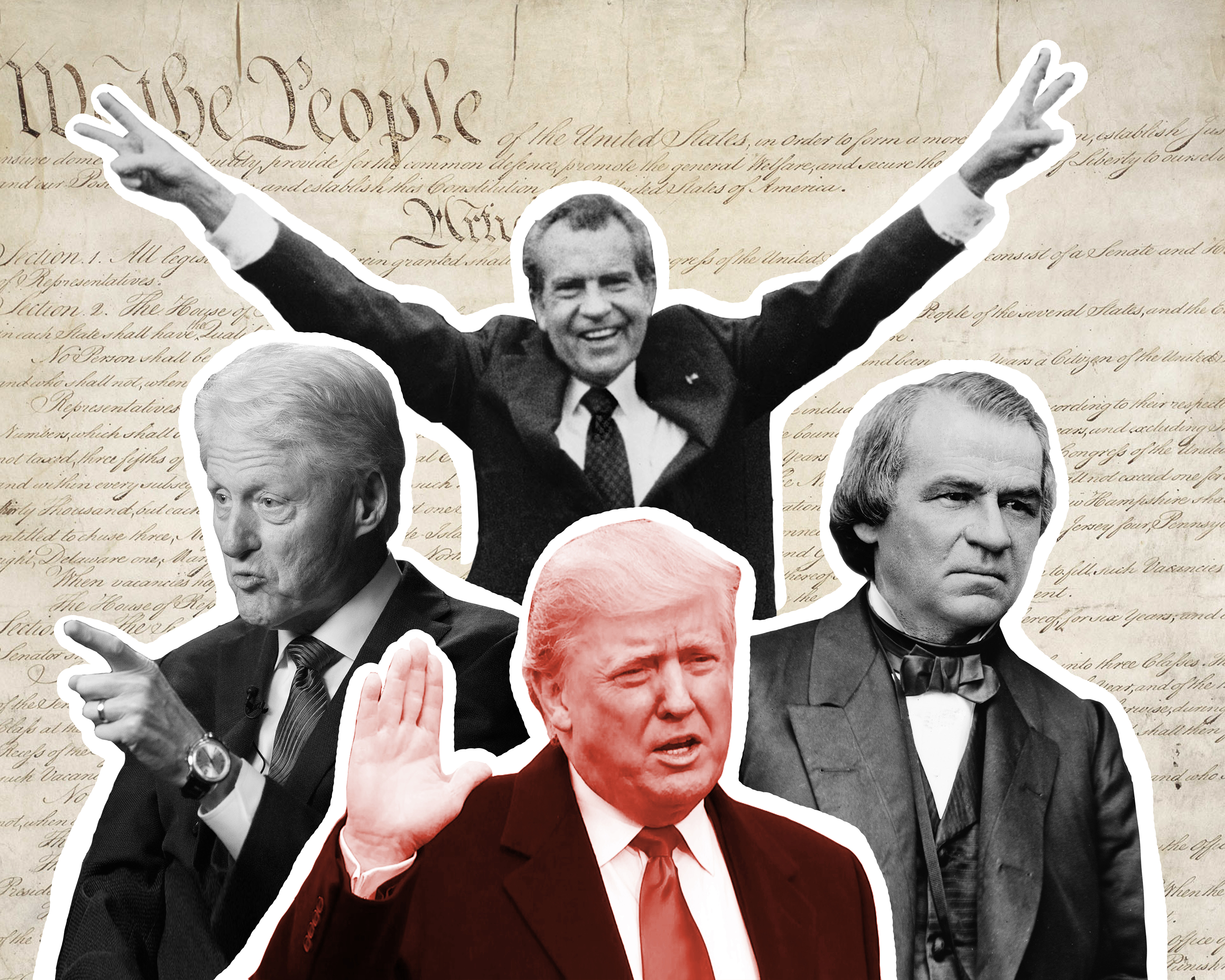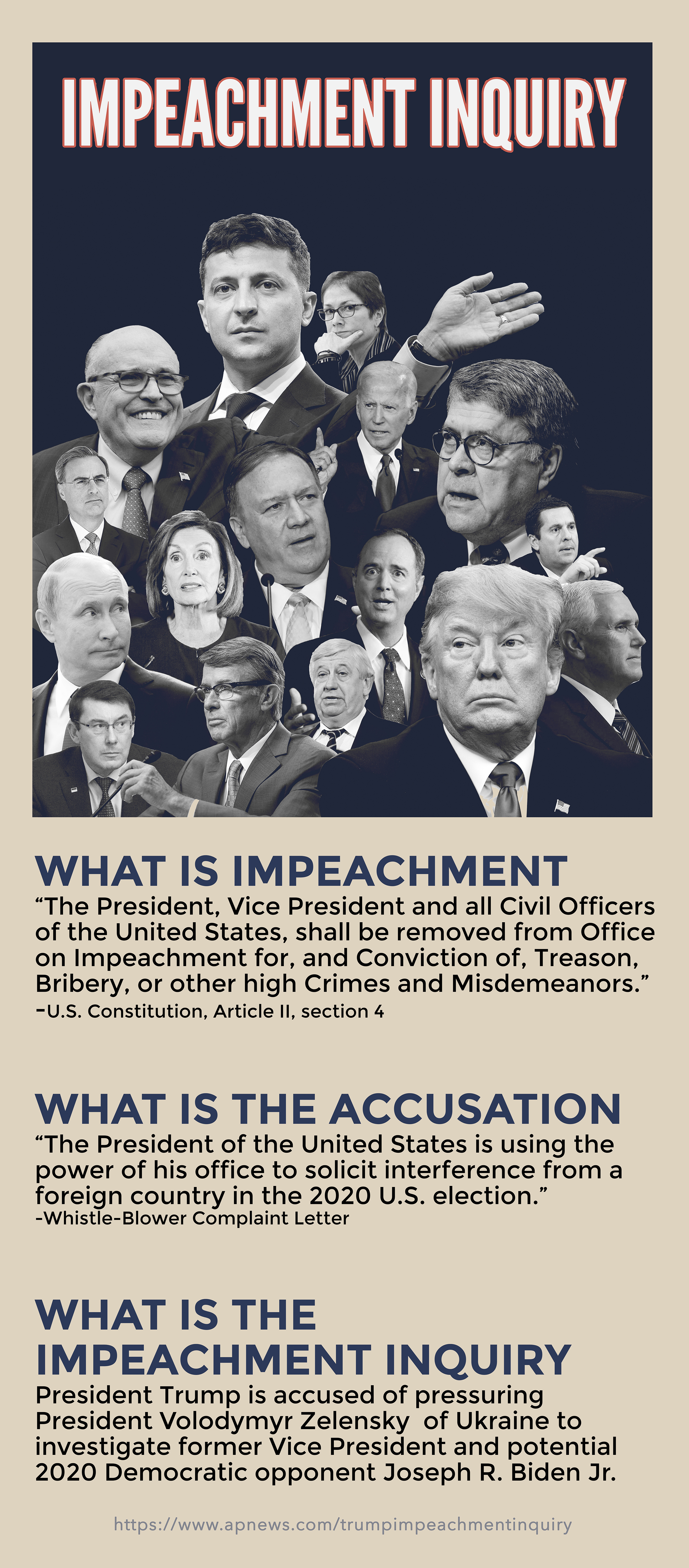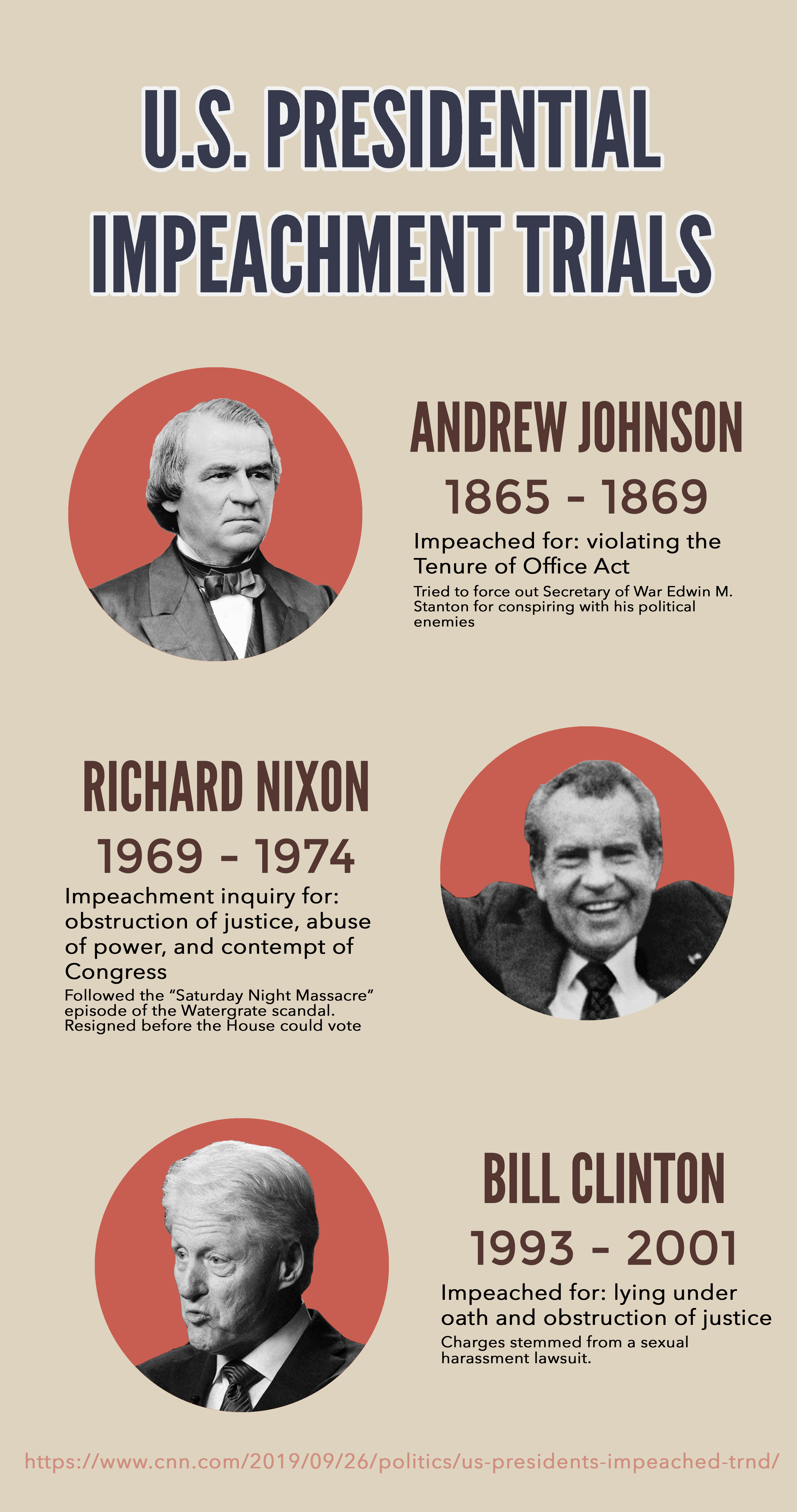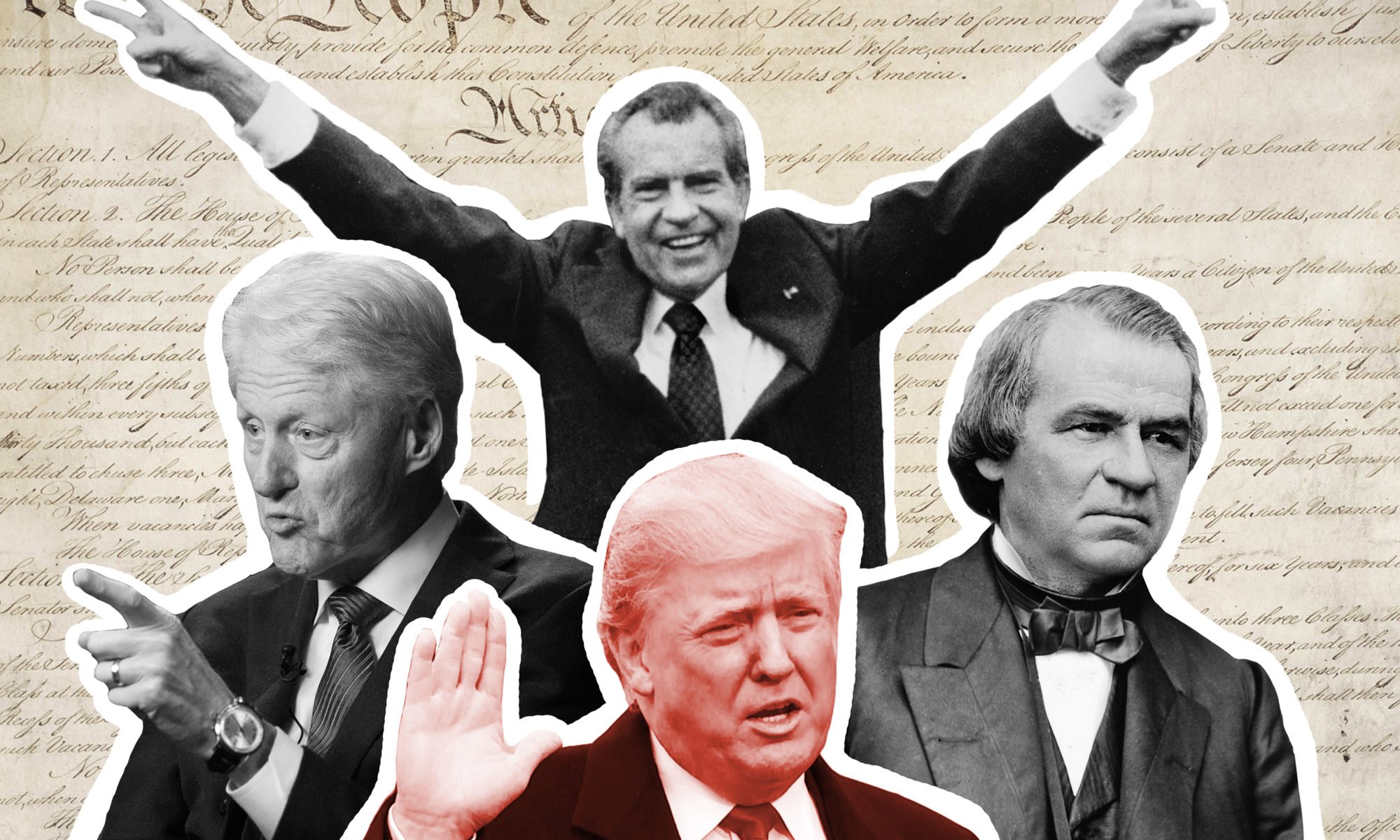
Impeachment. The word re-entered our political sphere with President Donald Trump’s 2016 election. Back then, it seemed like the vain hope of left-wing supporters, but now, it could become reality.
America’s first three impeachment trials—for Presidents Andrew Johnson (1868), Richard Nixon (1972), and Bill Clinton (1998)—didn’t end with convictions. The Senate acquitted both Johnson and Clinton, and Nixon resigned before the House of Representatives could vote on the charges.
While the Constitution defines impeachable actions as “treason, bribery, or other high crimes and misdemeanors,” the last parameter is still subject to interpretation. The Framers of the Constitution provided strict definitions of treason and bribery, but “high crimes and misdemeanors” is merely based off English parliamentary practice. This rule allowed impeachment for conduct that was not necessarily against the law.
What does this mean for Trump?
Well, first, Congress needs to determine whether or not he committed a crime. Even though a sitting president cannot be charged with a crime, proof that he’s committed one would weaken any defense that his team puts forward.
But, as the phrase “high crimes and misdemeanors” suggests, impeachment goes beyond criminality. At its heart, impeachment is the country’s defense against a presidential abuse of power.
The articles of impeachment against Nixon, Clinton and Johnson included abuse of power and contempt of Congress.
The impeachment inquiry for Trump came after reports of his July phone call with Ukrainian President Volodymyr Zelenskiy. During the conversation, he asked Zelenskiy to “look into” former vice president Joe Biden and his son. Days before, Trump unexpectedly froze hundreds of millions of dollars in military aid to Ukraine, suggesting that he could have been attempting a form of bribery.

The phone call exemplifies three “high crimes and misdemeanors” — foreign election aid, bribery and extortion.
A criminal investigation into Biden, one of Trump’s top presidential rivals, certainly would have helped Trump’s campaign going into the 2020 election season. He sought this investigation from Ukraine in exchange for military aid. By suspending that aid days before the phone call, Trump was showing Ukraine what would happen if they didn’t comply.
This is just the latest in a long list of suspicious and even impeachment-worthy actions and behaviors from Trump.
Over the course of his time in office, Trump has pursued his own agenda and interests, instead of working for the common good of the people.
By failing to completely separate himself from his personal financial interests, he has opened the possibility of conflict of interest. Both domestic and foreign parties can try to influence his decisions by sending payments to his “Winter White House” in Mar-a-Lago and his hotel on Pennsylvania Avenue.
He has also continued to own shares in various companies, such as Halliburton and Apple, which his own government taxes and regulates. He is the only modern president to not sell off controversial foreign investments and has a past of committing tax fraud, as a “New York Times” investigation found. Yet, his tax returns remain unreleased.
From day one, Trump’s ego has twisted the relationship between loyalty and duty, demanding fealty to him rather than to the country from his officials. He ordered his press secretary to claim that his inaugural crowd was bigger than it actually was. He forced the resignation of his first attorney general when he failed to shut down investigations into his campaign’s possible collusion with Russia. He told his first FBI director, “I need loyalty. I expect loyalty.” When he refused to pledge that loyalty, he fired him.
Trump responds to any form of opposition with attempts of elimination. A key aspect of democracy is its multi-faceted representation and differing opinions. Trump has attacked the foundations of our constitutional democracy.
He threatened to restrict Muslim entrance to the United States. He attacked the freedom of the press, calling news outlets the “enemy of the people” and echoing the Nixon tapes and “enemies list.” He falsely insisted that our electoral system, the basis of American democracy, was fraudulent.
His falsehoods are numerous. According to him, children were separated from adults at the border under Barack Obama’s administration; he passed the largest tax cut in history; the border wall is well under construction.
None of these are true, and they’re just a few examples.
What the Constitution is most concerned about, though, is his abuse of presidential power. By using the position for his own gain, he has violated the oath of office.
He placed his own interests above the people’s, finding ways to undermine the system of checks-and-balances.
During the investigation into 2016 Russian interference, he tried to obstruct it by teasing pardon offers, firing law enforcement officials and refusing to be interviewed. Congress could have enforced consequences like censure or impeachment, but he swerved these attempts by portraying them to the public as partisan and personal.

Right now, House committees are investigating issues that could become articles of impeachment. They will call administration officials to testify, demand documents and emails, and maybe request for Trump’s tax returns.
Yet Trump continues to attack the foundation of American federal government. The White House told House Democrats in a letter that it refuses to cooperate with the impeachment inquiry. The branches of government were intended to be separate but equal, and this defiance from the White House challenges that idea.
Among the rest of his misdeeds, Trump hasn’t lived up to the presidential roles specified in our Constitution. An often unrecognized role is the duty of chief citizen, which means the president is the representative of the people, working for our interest and providing moral leadership.
Is it morally right to refer to developing nations as “shithole countries?” To lie to the nation? To remain impassive in the face of white supremacy? To separate children from their parents and keep them in cages?
Is that what we want from our chief citizen, the representative of the American people, the leader of the United States?
Congress has Trump within their grasp. They can focus on the Ukraine phone call, but they cannot ignore the Mueller report or corresponding criminal charges and investigations. If they don’t use all of their cards, Trump will find a way to slither out of harm’s way entirely. This is too important of an issue for the inquiry to back down now.
Our nation is once again facing a president who abuses his position and ignores the power of Congress. The danger doesn’t lie in impeachment. Impeachment is the response. The real threat is a president who doesn’t live out his oath to the people.
Kayla Mayer can be reached at maye8518@stthomas.edu.

